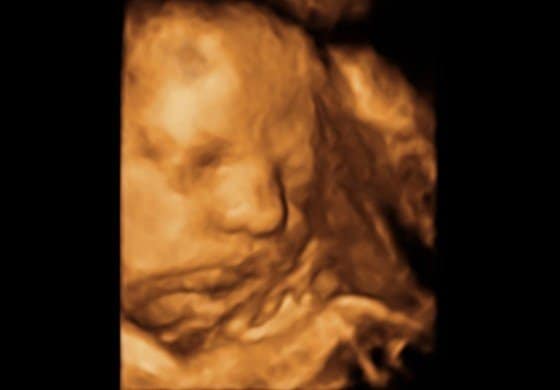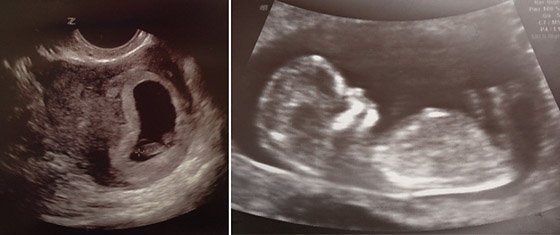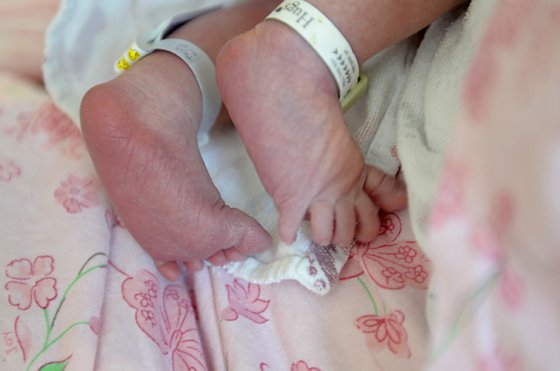The moment you see that positive pregnancy test you are bombarded with a wealth of information. And for many of us, several health related thoughts immediately flood our minds. Am I doing everything I can to create a “perfect” environment for my baby? Is the baby growing? Is the baby going to be healthy? And so forth. Within the last few decades modern medicine and research has allowed for some of these worries to be put to rest with Prenatal Genetic Screening and Diagnostics. If you are newly pregnant, here are some factors to consider in your prenatal care.
Throughout your prenatal care you can expect your doctor or midwife to go through some routine tests with you. These can include:
- Complete blood count
- Blood typing
- Urinalysis
- Rubella
- Tuberculosis
- Hepatitis B and C
- Rh antibody test
- Glucose
- Group B streptococci
- Ultrasound anatomy scan

At some point you will be presented with optional prenatal tests, this usually refers to genetic screening tests and genetic diagnostic tests. It is important to know that prenatal genetic screening tests vary from country to country. That being said, there are four, more or less, optional universal prenatal screening tests currently offered to pregnant women. The purpose of the screening test is to determine women who are more likely carrying a baby with genetic mutations or abnormalities. The screening test results will essentially provide you with a risk assessment statistic that estimates your chances, such as 1 in 1,000. See more benefits of DNA screening and information about your own genetic testing kit.
Most babies are born healthy with no genetic abnormalities. Genetic abnormalities are observed about every 3 out of 100 births.
These numbers will either indicate:
- that your chances of having a baby with certain genetic abnormalities are low enough that no follow up testing would be necessary.
- that there is an increased chance for a particular genetic abnormality in your baby and follow up testing would be advised.
If follow up testing is advised, more tests will be done that fall under the category of prenatal diagnostic testing. The procedures involved in diagnostic testing are often more invasive which can include amniocentesis and/or chorionic villus sampling (CVS). There are risks associated with diagnostic testing due to their invasive nature, directly entering the uterus with a needle. We’ll be focusing on prenatal genetic screening as opposed to diagnostic testing.

Prenatal Genetic Screening Tests
1. Serum integrated screening
The serum integrated screening is an option for women who are receiving prenatal care prior to the 14th week of their pregnancy. This test involves two blood tests: one in the first trimester between weeks 10 and 14 in pregnancy, and one in the second trimester between weeks 15 and 20 in pregnancy. Between the two blood tests, three hormones and two fetal proteins are measured which are found naturally in the mother’s blood.
2. Sequential integrated screening
The Sequential integrated screening utilizes the same 2 bloods tests from the Serum integrated screening as well as a specialized ultrasound called the Nuchal translucency ultrasound. This ultrasound is performed between weeks 11 and 14 of pregnancy and aids in the detection of Down syndrome.
3. Quad Marker Screening
The Quad Marker Screening is a blood test done between week 15 and 20 in pregnancy. It is deemed “quad” marker screening because the test is measuring four substances in the mother’s blood: one fetal protein and three hormones.
The three tests above enable doctors to assess your risk of certain (not all) genetic abnormalities, including:
- Down syndrome
- Trisomy 18
- Neural tube defects
- Abdominal wall defects
- Smith-Lemli-Opitz syndrome
4. Cystic Fibrosis Screening
Cystic Fibrosis screening is done through a blood test or a saliva test. It can be done at any point during pregnancy or even before, and is often grouped into the routine prenatal testing (but is completely optional). The test will tell you if you have Cystic Fibrosis or are a carrier of Cystic Fibrosis. Cystic Fibrosis is more common in certain ethnic populations, non-Hispanic white populations having the highest occurrence. If you are a carrier, your partner may be tested as well and genetic counseling may be advised.

Remember that these tests are optional and ultimately it is up to you and your partner to decide whether or not you would like genetic screening tests performed. Some women are strongly encouraged to have prenatal genetic screening performed due to the following reasons:
- Over 35 years of age
- Prior pregnancies with genetic abnormalities
- Family history of genetic abnormalities
In collaboration with your personal knowledge and doctor or midwife, you and your partner can make the best choices in prenatal care for your soon-to-be or expanding family.
Photo Credits: Kelly A Read Photography and The Paro Post
Sources: American College of Obstetricians and Gynecologists and American Pregnancy Association










































